
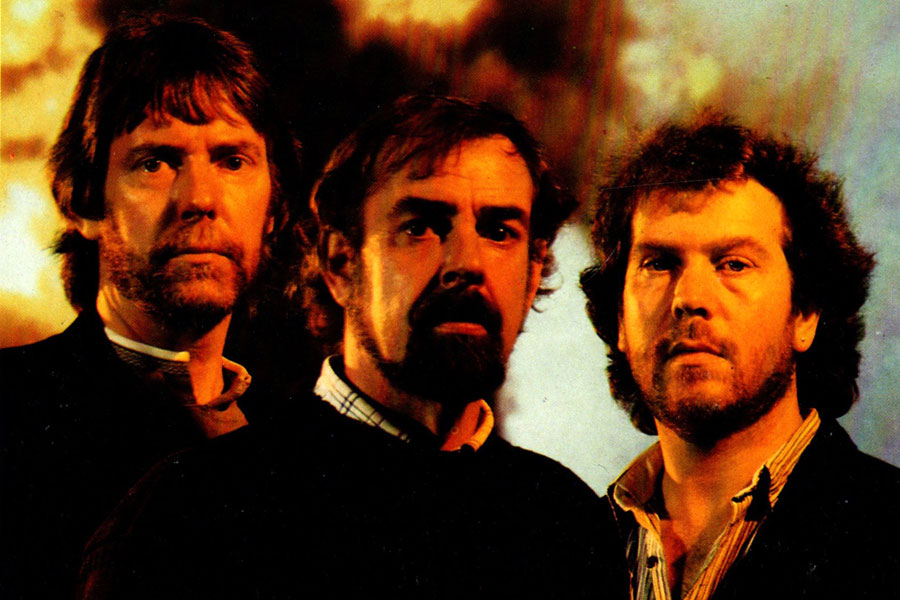
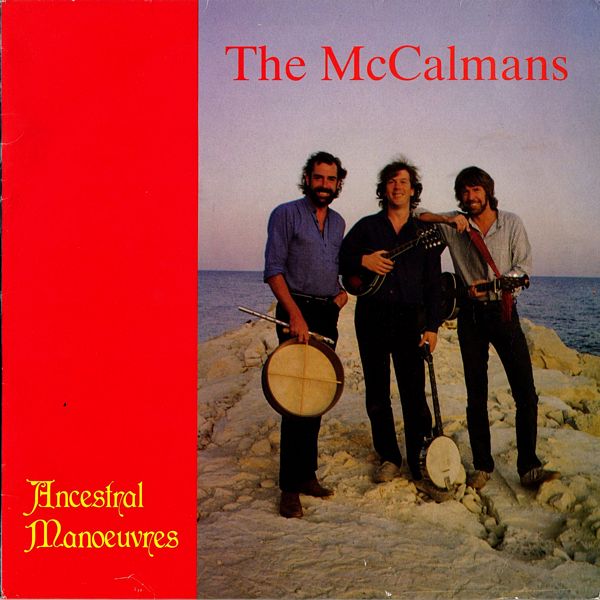 |
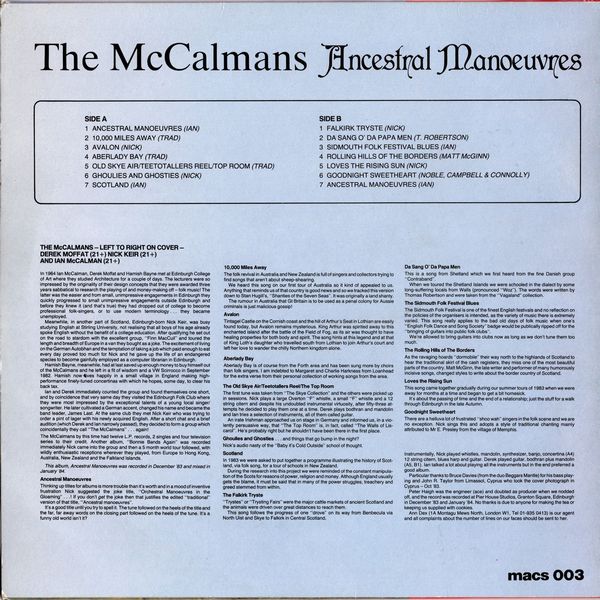
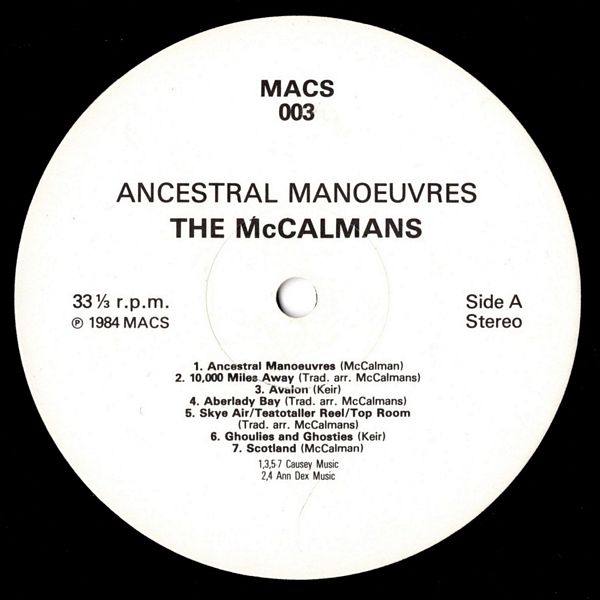
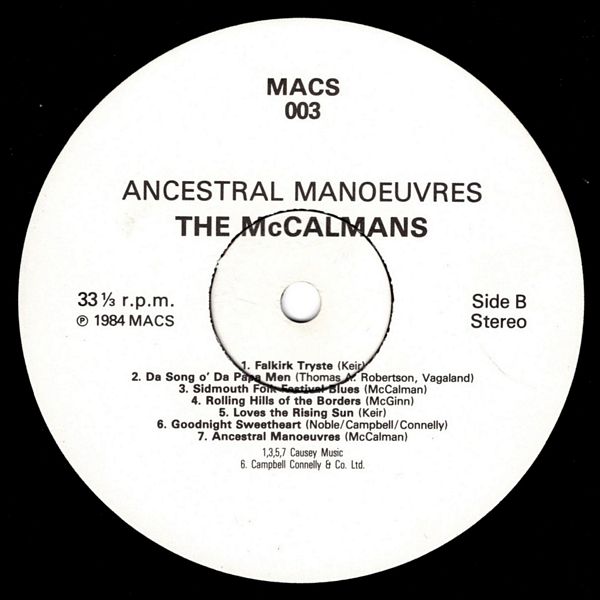
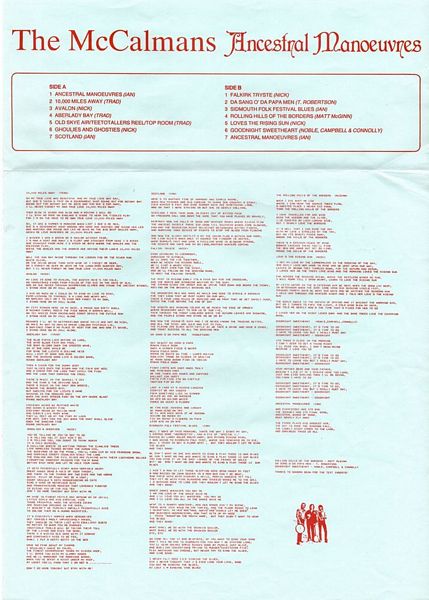 |
Sleeve Notes
In 1964 Ian McCalman, Derek Moffat and Hamish Bayne met at Edinburgh College of Art where they studied Architecture for a couple of days. The lecturers were so impressed by the originality of their design concepts that they were awarded three years sabbatical to research the playing of and money-making off - folk music! The latter was the easier and from small, unimpressive engagements in Edinburgh they quickly progressed to small unimpressive engagements outside Edinburgh and before they knew it (and that's true) they had dropped out of college to become professional folk-singers, or to use modern terminology. . . they became unemployed.
Meanwhile, in another part of Scotland, Edinburgh-born Nick Keir, was busy studying English at Stirling University, not realising that all boys of his age already spoke English without the benefit of a college education. After qualifying he set out on the road to stardom with the excellent group, Finn MacCuil and toured the length and breadth of Europe in a van they bought as a joke. The excitement of living on the German Autobhan and the temptation of taking a job which paid enough to eat every day proved too much for Nick and he gave up the life of an endangered species to become gainfully employed as a computer librarian in Edinburgh.
Hamish Bayne, meanwhile, had at last saved up enough money to buy himself out of the McCalmans and he left in a fit of wisdom and a VW Scirrocco in September 1982. Hamish now lives happily in a small village in England making high-performance finely-tuned concertinas with which he hopes, some day, to clear his back tax.
Ian and Derek immediately counted the group and found themselves one short, and by coincidence that very same day they visited the Edinburgh Folk Club where they were most impressed by the exceptional talents of a young local singer/ songwriter. He later cultivated a German accent, changed his name and became the band leader, James Last. At the same club they met Nick Keir who was trying to order a pint of lager with his newly acquired English. After a short chat and a brief audition (which Derek and Ian narrowly passed), they decided to form a group which coincidentally they call The McCalmans…again!
The McCalmans by this time had twelve L.P. records, 2 singles and four television series to their credit. Another album, Bonnie Bands Again was recorded immediately Nick came into the group and then a 5 month world tour followed, with wildly enthusiastic receptions wherever they played, from Europe to Hong Kong, Australia, New Zealand and the Falkland Islands.
Ancestral Manoeuvres — Thinking up titles for albums is more trouble than its worth and in a mood of inventive frustration Nick suggested the joke title, Orchestral Manoeuvres in the Gloaming … ! If you don't get the joke then that justifies the edited traditional version of that title, Ancestral manoeuvres. Its a good title until you try to spell it. The tune followed on the heels of the title and the far, far away words on the closing part followed on the heels of the tune. Its a funny old world isn't it?
10,000 Miles Away — The folk revival in Australia and New Zealand is full of singers and collectors trying to find songs that aren't about sheep-shearing. We heard this song on our first tour of Australia so it kind of appealed to us. Anything that reminds us of that country is good news and so we tracked this version down to Stan Hugills, Shanties of the Seven Seas. It was originally a land shanty. The rumour in Australia that Great Britain is to be used as a penal colony for Aussie criminals is just malicious gossip!
Avalon — Tintagel Castle on the Cornish coast and the hill of Arthur's Seat in Lothian are easily found today, but Avalon remains mysterious. King Arthur was spirited away to this enchanted island after the battle of the Field of Fog, as its air was thought to have healing properties for both body and spirit. The song hints at this legend and at that of King Loths daughter who travelled south from Lothian to join Arthur's court and left her love to wander the chilly Northern kingdom alone.
Aberlady Bay — Aberlady Bay is of course from the Forth area and has been sung more by choirs than folk singers. I am indebted to Margaret and Charlie Harkness from Loanhead for the extra verse from their personal collection of working songs from the area.
Old Skye Air/Teetotallers Reel/Top Room — The first tune was taken from The Skye Collection and the others were picked up in sessions. Nick plays a large Overton F whistle, a small F whistle and a 12 string citern and despite his undoubted instrumental virtuosity, after fifty-three attempts he decided to play them one at a time. Derek plays bodhrán and mandolin and Ian tries a selection of instruments, all of them called guitar. An irate Irishman approached us on stage in Germany and informed us, in a violently persuasive way, that The Top Room is, in fact, called The Walls of Lis-carol. He's probably right but he shouldn't have been there in the first place.
Ghoulies And Ghosties — … and things that go bump in the night? Nicks audio nasty of the Baby its Cold Outside school of thought.
Scotland — In 1983 we were asked to put together a programme illustrating the history of Scotland, via folk song, for a tour of schools in New Zealand. During the research into this project we were reminded of the constant manipulation of the Scots for reasons of power, religion and money. Although England usually gets the blame, it must be said that in many of the power struggles, treachery and greed stemmed from within.
Falkirk Tryste — Trystes or Trysting Fairs were the major cattle markets of ancient Scotland and the animals were driven over great distances to reach them. This song follows the progress of one drove on its way from Benbecula via North Uist and Skye to Falkirk in Central Scotland
Da Sang O Da Papa Men — This is a song from Shetland which we first heard from the fine Danish group Contraband. When we toured the Shetland Islands we were schooled in the dialect by some long-suffering locals from Walls (pronounced Woz). The words were written by Thomas Robertson and were taken from the Vagaland collection.
Sidmouth Folk Festival Blues — The Sidmouth Folk Festival is one of the finest English festivals and no reflection on the policies of the organisers is intended, as the variety of music there is extremely varied. This song really applies to the bad old days of folk music when ones English Folk Dance and Song Society badge would be publically ripped off for the bringing of guitars into public folk clubs. Were allowed to bring guitars into clubs now as long as we don't tune them too much.
Rolling Hills Of The Borders — As the ravaging hoards dormobile their way north to the Highlands of Scotland to hear the traditional skirl of the cash registers, they miss one of the most beautiful parts of the country. Matt McGinn, the late writer and performer of many humorously incisive songs, changed styles to write about the border country of Scotland.
Loves The Rising Sun — This song came together gradually during our summer tours of 1983 when we were away for months at a time and began to get a bit homesick. Its about the passing of time and the end of a relationship; just the stuff for a walk through Edinburgh in the late Autumn.
Goodnight Sweetheart — There are a helluva lot of frustrated shoo wah singers in the folk scene and we are no exception Nick sings this and adopts a style of traditional chanting mainly attributed to Mr E. Presley from the village of Memphis.